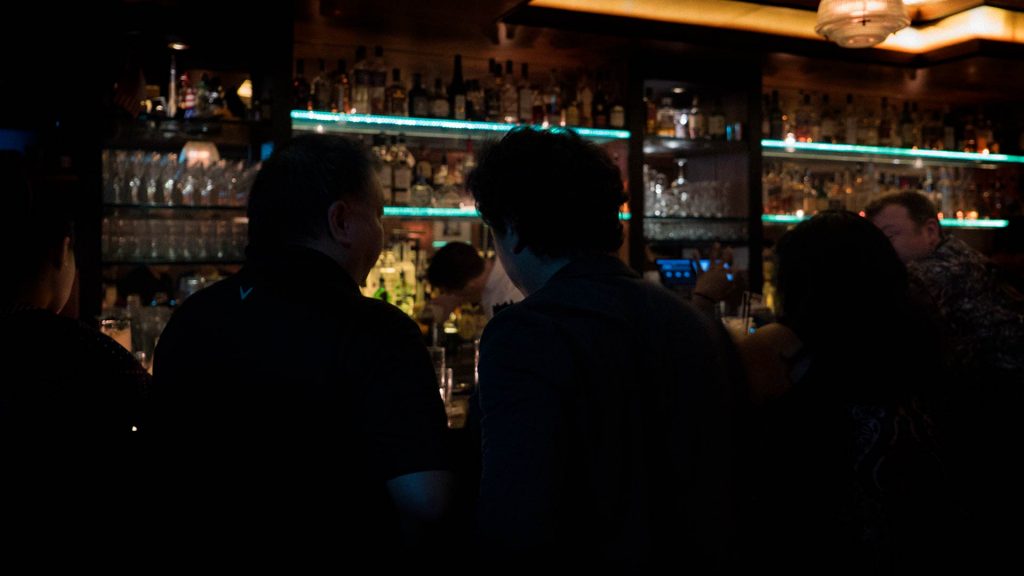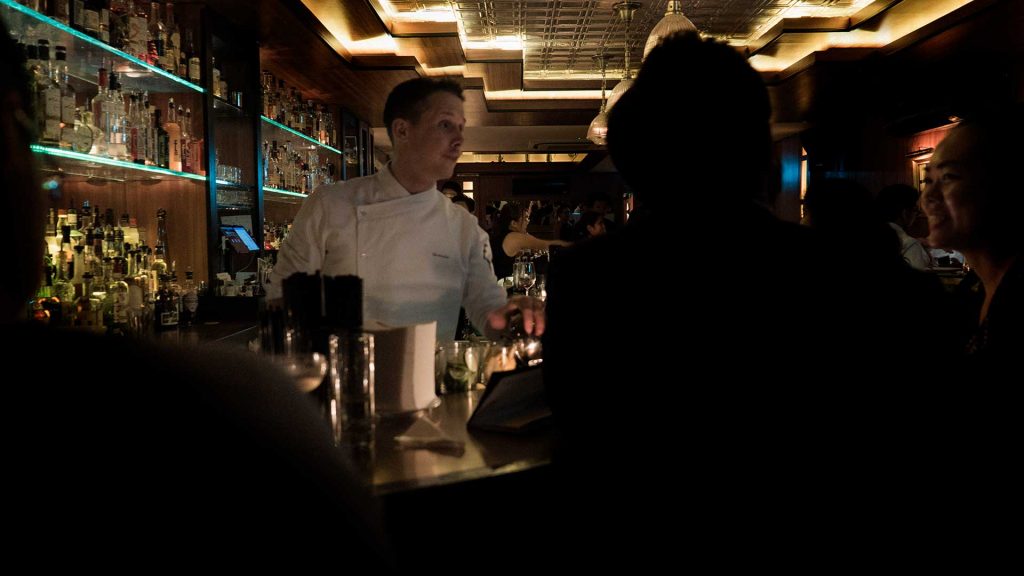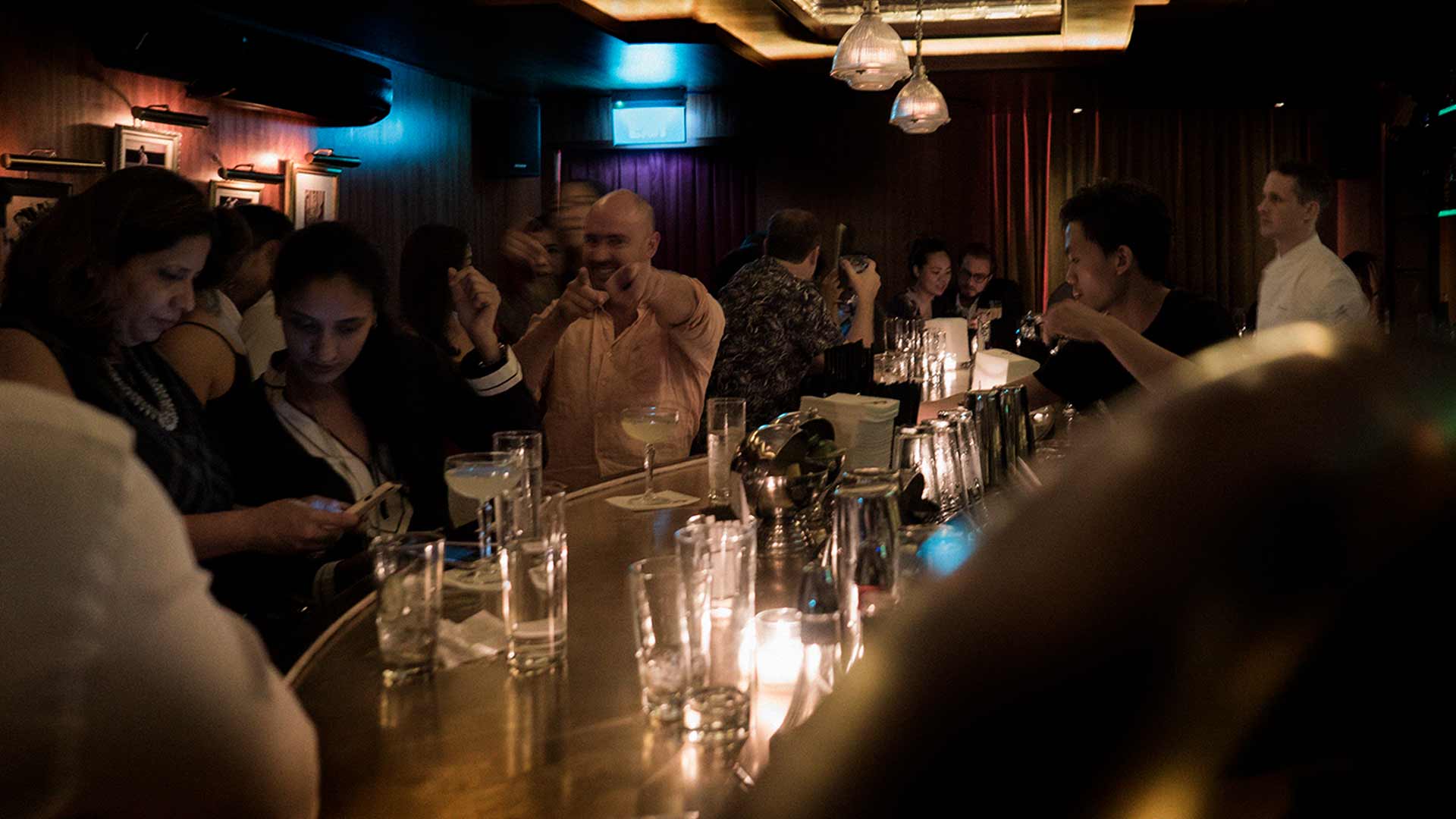“WHAT CAN I GET YOU?” Owen hollers at me over the bar, momentarily interrupting the conversation of two ladies who sit cramped between us.
“A Billionaire!” I shout back, and he echoes my order with a roar and a nod, “Billionaire!”
The music in Employees Only has been cranked up to skull thumping volume, and along with the Friday night crush, it feels like we’re in a really loud club. Make that a really loud club that’s really only the size of a small restaurant.
Head bartender and owner Steve Schneider tells me that if I think this is crazy, it’s easily four times more insane in New York. He’s been to Singapore about six times so far, and when the decision was made to bring EO to Singapore, he was already prepared that the concept would take some getting used to.
“I know that I’m a guest in this country,” he stresses, “And we’re not trying to bring anything here or to change anything. Sure, it’s a different product, but we’re just doing what we know best.”
All the drinks here are made by what can be easily mistaken for approximation. Jiggers, the requisite instruments of measurement used in every bar, don’t exist. Bartenders expertly clutch glasses, two or more in one hand, and streams of liquor cut through the air as bottles of navy strength gin are snatched and slung overhead with a kind of nonchalant efficiency.
In essence, this is the spirit of the place. Patrons mingle shoulder to shoulder in the area surrounding the bar. At the bar itself, there are seats for only about twenty. A little deeper into the place, a dining area accommodates about 25. Not that any of this matters—people stand where they like and talk to whoever they like.
While Employees Only can feel like a swanky restaurant at 8pm on any given day, it evolves into a raucous dive bar come 11pm.
Anyone who frequents Singapore’s many watering holes will know this: we don’t stand around with drinks in hand unless it’s a party. If there isn’t a seat or a table available, we leave for another bar.
Particularly in cities in the Western hemisphere, the opposite is the norm. Customers routinely brave packed establishments to sidle up to the bar, amiably competing with each other for the bartender’s attention. In most cases, everyone patiently waits their turn. Occasionally, there’s the rare asshole who cannot stop snapping his fingers until he gets to place his order.
At Employees Only, it works the same way. This can be particularly challenging for people of average height, since the crowd can get pretty dense, blocking the bartenders’ views of customers. When I was there however, this wasn’t a problem. I raised a hand to signal, and before I knew it, I was handed a menu.
If I’m gonna pay 25 bucks for a drink, there’s no way I’m not getting a table

Singaporeans aren’t used to this format. Steve says that there are customers who’ve walked in, taken a single look at the place, and left.
“It happens all the time,” he says.
When I found myself one Wednesday evening at Smoke & Mirrors, a rooftop bar at Singapore’s National Gallery, I couldn’t help eavesdropping on the conversation of a group of young adults.
“If I’m gonna pay 25 bucks for a drink, there’s no way I’m not getting a table,” one says.
“Ya man,” his friend (or colleague) echoes, “Places like Employees Only are so crowded, messy, and noisy; you only can stand—can’t take it man!”
A lady in a blue, severely cut dress chimes in, “And I have to go up to the bar to order? Who does that here?”
Therein lies, perhaps, the greatest challenge for this New York import. Employees Only presents Singapore’s bar scene with a unique value proposition: a different, more laid-back kind of drinking experience that puts atmosphere and geniality above potentially snobbish appreciation of crafted cocktails.
Their style of mixing drinks might suggest, “Fuck precision,” but drinks here are anything but sloppy or inconsistent.
The bartenders skip the use of jiggers (on a side note, the use of jiggers used to indicate the bartender was an amateur), but practise pouring drinks daily. In fact, this was one of the first orders of business when Steve completed his first round of hiring for Employees Only.
“I took everyone back to my place and all we did was practise our pouring, getting it right, making sure every drink was the same. At first they were all so surprised when I could pour at the same levels every single time. But within 30, 45 minutes, they were getting it too.”
This pairing of meticulous drink-making with the high-energy setting of the place reminds patrons that the drinking experience is at least one part uproarious celebration and one part wanton indulgence. Admittedly, this reminder is not for everyone.
In a country where alcohol is absurdly taxed, it inevitably means that only a certain class of individuals who can or are willing to pay this much for booze ends up flocking to cocktail bars. As such, customers frequently expect table service. They expect a classy, dimly lit ambience, complete with bespoke offerings and a mixologist who asks in a soft, even tone, “Sweet, salty or spicy?”
In a way, the personality of Employees Only spits in the face of this. It erases the class boundaries that the cost of alcohol in Singapore inadvertently dictates. Alcohol might be expensive, but that doesn’t mean we can’t all just remember that we’re here to drink, not to pretend we’re people we’re not.
By 11:50 PM on a random Thursday, the bar has become home to a mix of individuals: there’s a man in a T shirt and shorts having a beer on his own, there are colleagues grabbing after-work drinks; there are friends catching up. Because the place has gotten so loud, everyone looks like they’re in the middle of cutting shady, unscrupulous business deals as they lean in to speak into each other’s ears.
For Singapore at least, Employees Only is a microcosm of change anticipating the next step in the country’s bar scene. Mixology, anyway you see it, has become passé.

On my first visit to the place, I noticed right away that behind the bar, everyone has an easy chemistry. As Steve heaves a large plastic palette of glassware into the dishwasher, Owen whispers a joke to a bar-back who smirks in response. All of their eyes wander only to two places: the drinks they are making and the customers who might need attention.
What most people might not know is that at EO, everyone does everything. Those in the kitchen rotate with those at the bar. On the Thursday that I pop in to interview Steve, he’s doing prep work, and the day after, it’ll be someone else’s turn. Incentives and career paths are clearly defined for every employee.
He says, “In New York, Employees Only is defined by its staff. Over here, it will be exactly the same.”
When I eventually get round to relating what I overheard at Smoke & Mirrors, Steve is visibly disappointed.
“I know we can’t making everyone happy, but hearing that—It breaks my heart.”
“The thing is, we’re not bartenders,” he adds, “We’re hospitality professionals. We have someone at the door to do crowd control because we want everyone to get that attention they deserve. It’s a high energy place, sure, but if I can have at least 2 minutes of conversation with everyone who walks in the door, that’ll be great. That’s what we want.”
The man has a soft spot for Game of Thrones and Breaking Bad references, and points out that Employees Only is really only in its third or fourth episode, and we’re just getting to know the characters. In New York, Employees Only is known as “New York’s Best,” but then it is already in its sixth or seventh season.
Steve points out that if you walk into a place expecting this, then you already have some idea of “best” that you’re expecting. It sounds like something that could apply to any establishment when he ends off by suggesting,“People should give us a chance; come a little earlier when it’s quieter, and you can have a bite and a drink.”
As Singapore makes its slow transition out of second wave cocktail culture, a return to basics is imminent. And with the doing away of fancy garnishes and theatrical displays, the way we drink will inevitably mature as well. This doesn’t necessarily mean getting rid of craft and experiential cocktails. It just means the availability of different products and different cultures.
Soon, perhaps, we will no longer lament that there are no seats at the bar or that all the tables are taken. Instead, it’ll be, “Look, we can still stand in that corner over there!” This, to me, is less about buying into a different culture than it is simple prioritising.
As Tyrion Lannister said, “Everything’s better with some wine in the belly.”
Now, isn’t this all that really matters?






